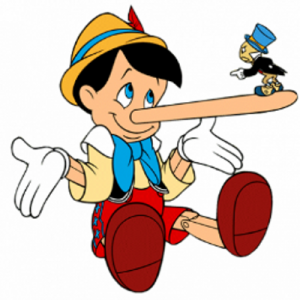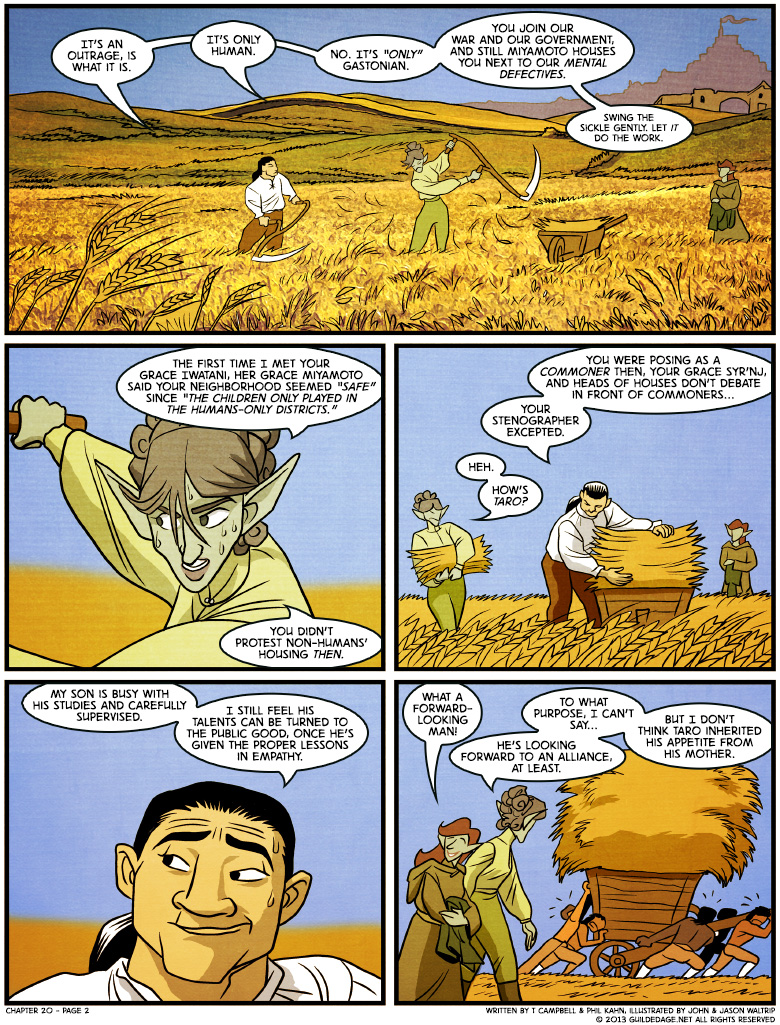Annotated 20-2
 Iwatani, on the other hand, has no problem using the word “commoner,” and that was Phil’s point: Syr’s better than that, he isn’t.
Iwatani, on the other hand, has no problem using the word “commoner,” and that was Phil’s point: Syr’s better than that, he isn’t.
I think this is my favorite Iwatani Sr. page, mostly because of what it doesn’t do. One of my pet peeves in pop entertainment is that characters’ lies and play-acting are often so obvious that no one with any sensitivity would believe them for an instant. Which is fine if they’re supposed to be blunt, bumbling fools, but often they’re meant to be political adepts (Iwatani certainly is) and still telegraph “I AM LYING AND EVIL” to the back row of the auditorium.
Y’know, like if Iwatani said here, “I’ll make sure you and your associates are moved into safer housing. We must all… look after each other, mustn’t we? Perhaps later, on some key initiative or other, I’ll need you to look after ME, heh-heh-heh-heh-heh.” And then smized into the camera.
As it is, he sympathizes with Syr’Nj like a person and handles her questions deftly and thoughtfully. Only her history with his family and the reminder that most of his farming is done by (ahem) day laborers keeps Syr’Nj from starting to trust him.











Also the ‘Swing the sythe gently, let *it* do the work’ is a powerfully good line, and really sums up how he gets things done. Why do all the hard back breaking work, when you can just nudge someone else into doing it for you?
Something that Taro never quite understood, he got the concept of ‘get others to do your work’ but never quite had that deft touch that Iwatani had to make people not mind or notice that they were being led
I’m not sure of the purpose of the workers in the background of the last panel?
It’s about who’s really doing all the hard work. Working in the field here was just a bit of showmenship on Iwatani’s part. (And the commentary leads me to believe they’re less paid than paid *for*.
Having actually used a scythe, I’d probably prefer the cart job.
It’s more interesting in terms of what it says about the Gastonian economy that using people instead of draft animals to haul heavy loads is financially efficient. There are a number of reasons why that may be, but it doesn’t jibe with the level of wealth visible elsewhere, which gives a faint hint that all might not be as-it-seems.
Yeah, that’s what I meant, mostly. I admit I haven’t ever used a scythe myself, but considering he was definitely just here for show anyway..
He might look like a hard-working, honest down-to-earth aristocrat, but in the end, someone else is always doing the dirty work for him.
I got that impression that it’s supposed to make Iwatani look like he’s only working for show? All I really get from it is that he doesn’t harvest his fields entirely alone, which doesn’t seem unreasonable.
That, and he maybe needs to invest in more carts.
I wonder if Taro was ever given those ‘proper lessons.’ If he was, it definitely seemed to miss the mark completely. Iwatani was definitely an evil and malicious villain, but he had some “greater good” in his head to keep things on a sort of track. Taro, in his short (pun intended) reign cared only for the power itself and despite being superficially right about the inadequacies of Bureaucracy was woefully under-equipped to deal with the determination of the subjugated.
If we assume Taro is a basic sociopath, then I don’t think there are any “empathy lessons” known to work in the real word. The best is “consequence lessons”.
Get enough consequence lessons and you wind up like his dad – able to play the consequences machine by ear, until you can deftly avoid them.
Don’t, and you won’t live that long, because everyone will know what you did was done by you.
At least, that’s been my experience with their type.
Iwatani was a great villain, honestly far more interesting than Taro by a mile, but I get that you included the fatal flaw of failing to see his boy for what he was because he likely just didn’t want to.
Which in turn gave Taro the overconfidence to think everyone else would have the same blind spot.
It’s a really nice reversal of character flaws.
I do like Iwatani as a villain. I think too many creators feel need to have their villains have ‘Blahaha! moment while the trues bastards of world seem very composed about what they do.
Iwatani Sr. would ham it up towards the end. As if the more powerful he got, the less concerned he was with maintaining the facade.
I didn’t remember this page.
In retrospect, it is a very interesting bit of character exposition. Not just about Iwatani and son. Here is Iwatani’s cultivated image of a refined, yet simple politiican doing his own farming chores.
Iwatani is also seen voicing criticisms about Miyamoto, notably his racism/species-ism. It may be a ‘divide and conquer’ approach on Iwatani’s part, but he may also be (mostly) sincerely seeing Miyamoto as a crude, disrespectful politician, unfit for the council. His support in throwing out Miyamoto later is then less of a spur-of-the-moment decision and more of a ‘was waiting for ages for the insufferable fool to make a career-ending mistake’.
Not that Iwatani isn’t interested in weeding out competition, but here are some hints on how he justify his decisions in doing so – to others and, maybe, also to himself.
I love all the consideration given to his “swing the sickle gently” line! I hadn’t thought of it relating to how he manipulates people as RubberBandMan pointed out. What I got from it was really just that he does come from a working background, he wasn’t always a cruel aristocrat, and there was actually a human buried under the schemer. Which makes for a much more interesting villain tbh. And this line added so much depth!
For me, the really interesting thing here is his use of the word “empathy.” Iwatani may be just as sociopathic as his son in many ways, but unlike Taro, he gets the need to at least appear to be a good or normal person to others. Yet another lesson that he doesn’t quite get across to his progeny.